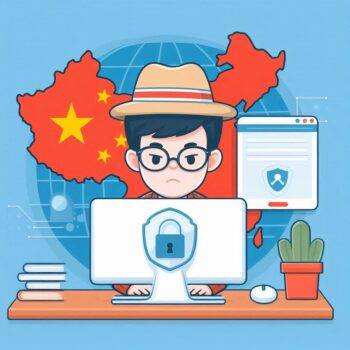
In today’s digital age, protecting your online privacy is more important than ever, especially in countries with unique internet regulations like China.
With the Great Firewall shaping the internet landscape and pervasive government monitoring, safeguarding your personal information requires a combination of tools, strategies, and awareness of local laws.
This guide provides practical, China-specific tips to help you navigate the digital world safely while protecting your privacy.
Understanding the Digital Landscape in China
China’s internet is governed by strict regulations that control access to foreign websites and monitor online activities.
Popular global services like Google, Facebook, and Twitter are blocked, while local alternatives such as Baidu, WeChat, and Weibo dominate the market.
However, these local platforms are subject to government monitoring, and user data is often accessible to authorities.
The Great Firewall of China employs advanced technologies like deep packet inspection (DPI) to filter and block content.
Additionally, the government enforces strict data localization laws, requiring companies to store user data within China, making it more accessible to authorities.
Understanding these challenges is the first step toward protecting your privacy.
Tips for Protecting Your Privacy Online in China
1. Use Secure Communication Tools
While apps like WeChat are widely used in China, they are heavily monitored.
For sensitive communications, consider using encrypted alternatives:
- Signal: A secure messaging app with end-to-end encryption. Note that Signal may be blocked in China, so download it before arrival.
- ProtonMail: A secure email service that uses end-to-end encryption to protect your emails.
- WeChat Tips: If you must use WeChat, avoid sharing sensitive information and regularly review your privacy settings.
For more on secure communication tools, visit ProtonMail’s blog.
2. Be Cautious with Public Wi-Fi
Public Wi-Fi networks in China, such as those in cafes or airports, can pose significant security risks.
Follow these tips to stay safe:
- Avoid Sensitive Transactions: Do not access banking or other sensitive accounts over public Wi-Fi.
- Disable Auto-Connect: Turn off the auto-connect feature on your device to prevent it from connecting to insecure networks.
3. Regularly Update Your Software
Outdated software can leave you vulnerable to cyberattacks.
In China, where surveillance and hacking risks are higher, keeping your devices updated is critical:
- Enable Automatic Updates: Ensure your operating system, apps, and antivirus software are set to update automatically.
- Install Security Patches: Promptly install any security patches released by software developers.
4. Manage Your Social Media Privacy Settings
Social media platforms collect vast amounts of personal data, and in China, this data may be accessible to authorities.
Protect your privacy by:
- Reviewing Privacy Settings: Regularly update your privacy settings to limit who can see your posts and personal information.
- Avoid Oversharing: Refrain from posting sensitive details such as your location, travel plans, or financial information.
- Be Mindful of Local Platforms: Apps like Weibo and Douyin (China’s version of TikTok) are subject to government monitoring. Use them cautiously.
For tips on managing social media privacy, see this guide.
5. Use Strong, Unique Passwords
Strong passwords are your first line of defense against unauthorized access.
Follow these best practices:
- Create Complex Passwords: Use a mix of letters, numbers, and special characters.
- Avoid Reusing Passwords: Use unique passwords for each account to prevent a single breach from compromising multiple accounts.
- Use a Password Manager: Tools like LastPass or 1Password can securely store and generate strong passwords.
6. Understand Local Laws and Regulations
Certain online activities that are legal elsewhere may be restricted or monitored in China.
For example:
- Content Sharing: Avoid sharing or posting content critical of the government, as this can lead to legal consequences.
- Data Localization: Be aware that data stored on Chinese platforms is subject to government access.
For more on China’s internet laws, see this overview.
7. Be Vigilant Against Phishing Scams
Phishing scams are a common method used by cybercriminals to steal personal information.
Protect yourself by:
- Verifying Email Senders: Check the sender’s email address for signs of spoofing.
- Avoid Clicking on Suspicious Links: Hover over links to see the URL before clicking.
- Report Phishing Attempts: Use built-in tools to mark phishing emails as spam and report them to your email provider.
8. Encrypt Your Data
Encrypting sensitive files and documents stored on your devices can protect them from unauthorized access.
Use built-in tools like:
- BitLocker (Windows): A built-in encryption tool for Windows.
- FileVault (Mac): A built-in encryption tool for Mac.
For additional encryption tools, see this list.
Additional Considerations
Offline Privacy Risks
In China, offline privacy is also a concern. For example, internet cafes require ID verification, and border officials may inspect your devices.
To protect your data:
- Use Encrypted Storage: Store sensitive files in encrypted folders.
- Travel with Minimal Data: Avoid carrying unnecessary sensitive data on your devices.
Conclusion
Protecting your privacy online in China requires a combination of tools, practices, and vigilance.
By choosing secure communication tools, keeping your software updated, and staying informed about local laws, you can navigate China’s digital landscape safely.
Stay proactive, educate yourself on potential threats, and take steps to safeguard your personal information in this unique and highly regulated environment.
For further reading, check out:


